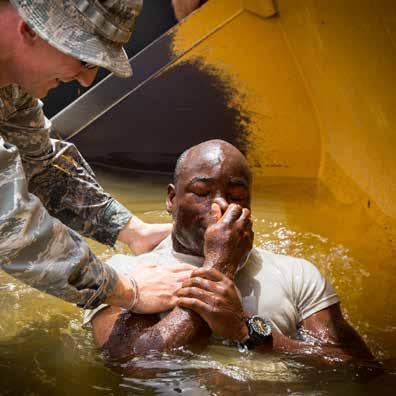BECOMING FISHERS OF MEN
Planting churches in the marketplace pg. 18
GRACE INSIDE
Planting church in prison pg. 26



Planting churches in the marketplace pg. 18
GRACE INSIDE
Planting church in prison pg. 26


THE NEW FACES OF CHURCH PLANTING Renewed focus on diversity, innovation, and community pg. 4

Earlier this year, my mentor and dear friend, Martin Sanders, passed away. As we grieved the loss of his presence and impact on the world, we were also filled with gratitude at his example. When I looked around the room at the funeral, it was filled with people from various backgrounds, with distinct personalities, and even some differences in theological interpretation. The constant? We were all friends in the Kingdom. Yes, some of us directly because of Martin, but all of us because of Jesus.
Recently, I’ve been thinking a lot about “Kingdom friendship.” At the end of the day, those of us who participate in church life together, small groups, meals around a table, and even in a denomination like The Alliance are simply people who have become friends in Jesus’ Kingdom and have decided it’s better to be together than alone.
Friendship, like family, is never simple or perfectly clean. There are heartaches, differences, frustrations, and even ruptures. However, the people we journey through this life with point us to a deeper reality—we are not simply individuals who believe something in our heads; we are a community who lives out our faith together.
And when friendship turns into partnership, the fruit of the Kingdom begins to grow around us. In this issue of Alliance Life, you’ll see one of our core areas of focus in the United States highlighted: church planting. How do churches get planted? They don’t just fall out of the sky into a neighborhood fully formed and start singing songs. No, it starts with a few friends, maybe people who would have never found one another, but with their common desire to surrender to Jesus and reach their community, they launch a new friendship hub—a church.
Living in community isn’t easy. So much of friendship is just plain hard work. But, as my friend Dave Powers says, when people submit to Jesus and one another, not only do they become friends, but they also get to launch some Kingdom mischief together.
So, here’s to friendship and holy mischief—and more communities of faith being born in this country and around the world!

Tim Meier Vice President for Development
Contact alifesubs@cmalliance.org for address and subscription changes.
Contact alliancelife@cmalliance.org for questions, submissions, and advertising information.
Contact media@cmalliance.org for press inquiries.
© ALLIANCE LIFE
ALLIANCE LIFE is published by The Christian and Missionary Alliance, One Alliance Place, Reynoldsburg, OH 43068. Member, Evangelical Press Association. Printed in the USA.
POSTMASTER: Send address changes to ALLIANCE LIFE , One Alliance Place, Reynoldsburg, OH 43068.
When requesting a change of address, please give both the old and new addresses. Direct all correspondence and changes of address to ALLIANCE LIFE One Alliance Place, Reynoldsburg, OH 43068. Toll free: (877) 284-3262; email: alliancelife@cmalliance.org. Website: www.alliancelife.org.
The Alliance is committed to world missions, stressing the fullness of Christ in personal experience, building the Church, and preaching the gospel to the ends of the earth. ALLIANCELIFE carries on the tradition of more than 140 years of publishing stories of God at work through Alliance people in the United States and throughout the world.

www.alliancelife.org
THE NEW FACES OF CHURCH PLANTING
Renewed focus on diversity, innovation, and community | by Iván Martí | pg. 4
BROKEN, LOVED, AND BETTER
TOGETHER Ministry in a postmodern world by Kristofer Cook | pg. 10
FREE VERSE
Quotes from the Kingdom | pg. 13
TOZER ANTHOLOGY
Compiled by Harry Verploegh | pg. 13
PLUCKED FROM THE FIRE by Thomas Lampley | pg. 14
18 Acts 1:8
BECOMING FISHERS OF MEN Planting churches in the marketplace by David Gomez | pg. 18
YOUR GENEROSITY IN ACTION
Beyond the Clouds and Smog by Heidi, an Alliance worker serving in Europe | pg. 22
GRACE INSIDE Planting church in prison by Hannah Packard | pg. 26
BOARD SUMMARY LETTER by Thomas George | pg. 38
PRAYER IS PRIMARY
Requests from Alliance workers | pg. 39
ALLIANCE FAMILY NEWS
Personnel changes, obituaries, and classified ads | pg. 40

FOUNDATIONS
A Light in the Darkness
Adapted by Alliance Life staff | pg. 46




Renewed focus on diversity, innovation, and community

by Iván Martí



The new wave of church planters is diverse and also highly innovative. These leaders are rethinking traditional church-planting models and embracing new methods that are more sustainable and impactful in
One significant trend is the rise of bi-vocational ministry, where church planters hold secular jobs alongside pastoral duties. This approach provides financial stability and deepens connections with the broader community. Bi-vocational ministers often find that their secular work offers unique opportunities for ministry and outreach, enabling them to build relationships and serve in contexts far removed from traditional church settings. One of these bi-vocational pastors is Rafael Perez. He is a university professor with degrees in computer engineering and a PhD in business administration. After God used several encounters, including church-planting conferences and training, he started a church with his wife, Lorna,
The digital revolution has also impacted church planting. The COVID-19 pandemic accelerated the adoption of online worship and virtual communities, and many new church planters are continuing to build on this foundation. Launching an online church campus involves creating e-communities that gather for worship, small groups, and fellowship via digital platforms. This approach allows church planters to reach geographically dispersed or homebound individuals and provides a flexible option for those seeking community in the digital age. One of our churches exploring this alternative is Movement Church in Port Charlotte, Florida. In a conversation with Worship Pastor Andres Martí, he discussed the importance of having the right technology, systems, and leaders before you launch. Currently, they are continuing to build the necessary infrastructure. Still, they have a weekly online attendance of more than 250 people and are working on the steps to have it as a fully functional online campus. Another innovative approach is the formation of microchurch networks. Planters of these churches create intimate, local gatherings emphasizing per-
Leaders are rethinking traditional church-planting models and embracing new methods.

sonal relationships and discipleship. These personal connections are the heart of their approach, involving building strong bonds with members, identifying and empowering potential leaders, and ensuring that each microchurch remains adaptable and relevant to its unique cultural context. This model often appeals to those disillusioned with traditional church structures and those who are looking for a more hands-on, practical expression of their faith. We see them in urban and rural areas—from Bloomfield, New Jersey, with The Alliance Underground to New London, Ohio, where lay elders are working to establish a rural area microchurch network.
As they continue to lead with vision and compassion, these modern church planters are charting a course for a more inclusive, just, and sustainable future for the church and the communities they serve.

ful action to address them. For example, two of our churches decided to reach the Deaf communities in their areas. One is Alliance Bible Church in Waco, Texas, where Pastor Mark Failing has challenged his congregation to volunteer and learn sign language to better support, encourage, and evangelize a growing population of Deaf people in the surrounding areas of Waco and their universities. Pastor Richard Larson, who is Deaf himself, already has boots on the ground, meeting with Deaf community groups, nonprofits, and schools, introducing himself and the new church plant, Spring Forth Deaf Church. Another example is ACM Isabela, where Pastor Danny Bobé challenged his congregation to learn sign language. This resulted in a significant outreach to their town’s Deaf community.
Some new church plants are deeply involved in social justice work, advocating for marginalized communities and addressing systemic inequalities. These churches often collaborate with local organizations, participate in advocacy efforts, and directly support those in need. This focus on social justice is rooted in a belief that faith should be lived out through actions that promote justice and equality. Economic empowerment is also a priority for many new church plants, particularly those in underserved communities. Job training programs, financial literacy workshops, and small business incubators are common in these new church plants. These programs aim to provide individuals with the skills and resources to achieve economic stability and independence. By addressing economic disparities, these churches are helping to build stronger, more resilient communities.
of modern church planters are setting the stage for a more inclusive and impactful church landscape.
As these leaders continue redefining what it means to plant and lead a church, they challenge traditional notions of church structure and function. Their work underscores the importance of adaptability, resilience, and a deep commitment to serving others. By embracing diversity and innovation, they ensure that the church remains relevant and vital in an ever-changing world.
The new faces of church planters in The Alliance represent a dynamic and transformative force within our tribe. Their efforts are revitalizing faith communities and making a significant impact on society at large. As they continue to lead with vision and compassion, these modern church planters are charting a course for a more inclusive, just, and sustainable future for the church and the communities they serve. What about you—will you consider being one of our next Alliance church planters?

Iván Martí is the national leader for church multiplication and leadership development for the C&MA. He and his wife, Lizzette, have three sons, three grandsons, and one granddaughter.

You can receive a tax deduction and make a gift that pays you income for life! Like other Alliance donors, Mary found that a Charitable Gift Annuity (CGA) is a great way to make a gift and get additional annual income. A CGA pays you income for life at rates between 5% and 10%, based on your age, and a portion of your payouts are often tax-free. Any remaining gift amount will continue your legacy with The Alliance.
You can make your CGA gift with cash or non-cash assets like stocks and mutual funds.
For more information, scan the QR code, call us at 866.824.4172, or email service@orchardalliance.org.

If you are relatively healthy and expect to live well into your 80’s or 90’s, a deferred CGA might be a great option. A deferred CGA enables you to decide when future payouts will start, possibly when you anticipate a need for additional income.

by Kristofer Cook
In 2021, during our first term as Alliance international workers and yet another round of intense COVID-19 restrictions where we serve in Bordeaux, France, God led us to plant our church, Mosaïque. We didn’t start out intending to plant a church. Instead, the Holy Spirit moved our non-believing friends to seek Him out. This led to us starting a “pop-up church” or “église éphémère.”
Our tagline for Mosaïque is broken, loved, and better together. And our goal is to grow the mosaic of God by seeking other broken tiles and adding them to it. French culture is extremely resistant to the gospel—and yet the Kingdom advances.
In 1 Corinthians, Paul states clearly that he will become all things to all people for the sake of winning some (see 1 Cor. 9:19–23). In this vein, rather than fight against this resistant culture or try to revert it back to something with which we are more comfortable, we choose to follow Paul’s example. We use the culture to reach those who are in it.
France is postmodern, post-Christian, and poststructuralist. Both postmodernism and post-structuralism have strong roots in French intellectual life and create significant barriers to gospel transmission. Only an individual’s subjective experience matters to them. The deconstruction of their shared experience started in the 1940s. The overarching metanarrative, or collective story, of the Catholic Church has been shattered. People are deterministic, directed to act by the confluence of their genes and experiences. All of these things create barriers to the gospel.
Each barrier is also a novel opportunity for gospel transmission. When speaking to someone with a modernist mindset, personal experiences are diminished because they are subjective, difficult to quantify, and untestable. Therefore, when someone speaks of a divine encounter, it is quickly and easily written off as a hallucination or otherwise not credible. It’s not something that can be easily reproduced, measured, and tested. Sharing these experiences and stories within this framework is not an effective method of evangelism.
However, in a postmodern and post-structuralist context, an underlying value is the sacrosanct nature of the individual human experience. While many Christians might bemoan this transition away from modernist objective truths and structures, this also creates new openings for us. When we are speaking to young French people with whom we have deep relationships, these divine experiences become powerful vehicles of the gospel. I have never had someone discredit the real, lived experiences that I have had with Jesus. Instead, they listen with rapt attention. No one says, “That didn’t happen” or “You were just imagining that.” To do so would be a violation of their own beliefs. Their lived experience is their reality, and therefore, my lived experience with Jesus is mine.
Using this framework makes these experiences and divine encounters unquestionable from their point of view. This radical acceptance of the other is often painted in a negative light and is a wedge issue in the current culture wars. And yet, Jesus can use this worldview to open the spiritual eyes of the blind.
When the prevailing metanarrative is destroyed—in the case of France, the metanarrative of the Catholic Church—what results is a society in which there is no longer a unifying story. Meaning unravels. Purpose is lost. In a realm of hyperindividual subjectivity, people are hyper-alone. When my personal reality is sacrosanct, it becomes incredibly difficult to attach it to the reality of other people, and what we see as a result is a splintering of society. We are, in fact, the stories we tell.
This factor is multiplied by the internet. Individuals within this postmodern culture can find echo chambers online that reinforce their artisanal view of reality, and external voices are by nature excluded from having a mitigating effect. Much social science research has been done both in the United States and Europe that shows this increased tribalization and polarization.
This, too, provides a new opportunity. People hunger and thirst for community in a way that doesn’t exist in a more traditional society. The gospel allows us to create

We have so much to offer—a personal experience with God, a loving community, and a future marked by deeper life in Christ.
community anywhere. Our vision of heaven is people from every tribe, tongue, and nation gathered around the throne of God. Our differences persist, and yet true and perfect community happens because our aim is the same. Instead of trying to make everyone like us and insisting that people change into our image, we insist that they set their focus on becoming like Jesus. As we collectively aim to be like Him and encourage one another to do the same, a real community is born. This is the living out of “Love the Lord your God with all your heart and with all your soul and with all your mind” (Matt. 22:37).
In a world where tribalism has run rampant, the foundational ethic of Christ becomes revolutionary. When we are separated into camps and factions, loving your neighbor as yourself becomes a subversive act. Like sitting with your drugged-out neighbor until the paramedics arrive. Or like getting to know your neighborhood drug dealers and having coffee with them while they stand on the corner. Or inviting refugees to come live with you. Loving our neighbor is both the end and the means of establishing the Kingdom of God. This foolish love for the other, specifically the other who is not like us, meets a deep felt need in this hyperindividualist context.
We have exactly what the post-Christian, postmodern, post-structural person needs. Praise God! Another of the assumptions this type of culture makes is surprisingly mechanistic or fatalistic. You can see it laid bare in phrases like, “I was born this way.” It is equally seen in the DNA-centric view of what it means to be human. With these views, at their core, there is no way of overcoming the things imported to us by our DNA.
One of our friends came to faith in our first term in France. Jesus, feeling particularly generous, even let me see the exact moment when this happened. While praying with this unbelieving friend, the Holy Spirit led me to say, “You can change.” In a culture that says individuals are just a product of their genes (and therefore their decisions cannot be questioned), willed change is inher-
ently impossible. At that moment, my friend believed for the first time that those things with which he was wrestling were not predetermined. Victory was possible. He couldn’t believe in change for himself, but he heard the still small voice of God whispering to him that it was. He could believe in that. The spiritual transformation that has resulted in him has been a thing to behold.
People everywhere feel stuck. They have things in their lives that, by their own definitions, are wrong and that they don’t want to keep doing. When this is coupled with the destruction of the path to redemption and change, they feel hopeless to do anything about it. This is where the deeper life with Christ shines brightest. Our God can and does transform us into something new!
We have the opportunity to share our transformed lives with the people around us. They cannot, by their own admission, discount God’s transforming work in us. These transformed lives, when lived together, create a loving community that stands in opposition to tribalism and fragmentation. In this loving community, newcomers are invited into a deeper life in Christ that they then share in.
Church planting in France has been complicated. I am sure the same thing can be said of where you are. People are broken. They are loved by God. They are better together. We have so much to offer—a personal experience with God, a loving community, and a future marked by deeper life in Christ. We didn’t set out to plant a church in our first term, but we shared Jesus and our experience with Him. We created a community that accepted “outsiders.” We offered people the possibility of change. From these precepts, a church—Mosaïque— was born.

Kristofer Cook is an international worker with The Alliance serving with his wife, Bridgie, and children in Bordeaux, France. He has his master of divinity from Alliance Theological Seminary and is passionate about philosophy and theology.
“Then the master told his servant, ‘Go out to the roads and country lanes and make them come in, so that my house will be full.’”
—LUKE 14:23
“God strengthened the church, and its life was marked by reverence for the Lord. Encouraged by the Holy Spirit, the church continued to grow in numbers.”
“Just as the true fruit of an apple tree is not an apple, but another tree; the true fruit of a small group is not a new Christian, but another group; the true fruit of a church is not a new group, but a new church; the true fruit of a leader is not a follower, but a new leader; the true fruit of an evangelist is not a convert, but new evangelists.”
Compiled by Harry Verploegh
The continued neglect of the Holy Spirit by evangelical Christians is too evident to deny and impossible to justify.
In the Scripture, the Holy Spirit is necessary. There He works creatively, powerfully; in popular evangelical Christianity He is little more than a poetic yearning or at most a benign influence. In the Word He moves in majesty, with all the attributes of the Godhead; in contemporary Christianity He is a mood, a tender feeling of good will.
Our Lord, though He was very God of very God, did not work until He had been anointed with the Holy Spirit (Acts 10:38). The Son did His work of love as a Spirit-anointed Man; His power derived from the Spirit of power.
God does His work by the operation of the Holy Spirit, while Christian leaders often attempt to do theirs by the power of trained and devoted intellect. Bright personality has taken the place of the divine afflatus.
Only what is done through the Eternal Spirit will abide eternally; all else is wood, hay, stubble (1 Cor. 3:11–13).
It is a solemn thought that some of us who fancy ourselves to be important evangelical leaders may find at last we have been but busy harvesters of stubble.
—from God Tells the Man Who Cares. Originally published in Alliance Life on February 5, 1992.


by Thomas Lampley
I asked myself:
“Why should I fear in times of trouble, when I know my Redeemer lives?”
Once, money made me feel as though I lived in a bubble, but more money, more problems; I had double the trouble. I thought wealth would provide me security in life; I had rejected the truth and embraced the lie.
I sought a sense of redemption, much too costly to buy. On the verge of gaining the world and losing my soul when I die, hustling and grinding, trying to pull myself up, not knowing I was unworthy to drink of the cup.
But I got blessed one day and finally realized that no amount of money could ever pay the price. Got sick of wallowing in the muck and the miry clay, then I heard and believed the true gospel one day.
I learned of the cost that spared me from God’s wrath, then I counted it up and it was simple math. Nothing that I could surrender would equal His sacrifice. Propitiation for my sins could only come through Jesus Christ.
So—why should I fear in times of trouble?
I know my Redeemer lives!

He laid down His life and His blood was spilled. They pierced Him through, and my Savior was killed. They divided His garments, and they unsheathed a sword. That’s what happened the day they crucified my Lord.
When His precious blood sprinkled the Mercy Seat, the Cross of Calvary made my redemption complete. It was not like the blood o ered from a goat or bull, but precious blood o ered once, and I was purchased in full.
It was the atoning sacrifice needed to set me free. Since that day, it’s been nothing but the blood for me. The thoughts and intents of my heart—bone and marrow cut asunder. I was plucked from the fire on that day I went under.
I was delivered from captivity, snatched from the realm of the damned. I was blood-bought and redeemed by the blood of the Lamb. I was reconciled from darkness, granted forgiveness of sin, and I never placed my trust in earthly riches again. Some may say, “There is no redemption,” but the devil is a liar. The day He died on the Cross, I was plucked from the fire.


Place du Marché Notre-Dame is a market in Versailles, France. Among the largest markets in the country, it has been located in the same place since the seventeenth century. Markets like this one are an important element of French culture.

Planting churches in the marketplace
by David Gomez
The state of Arkansas is a part of what is well known as the Bible Belt of the United States. Within the cities of this region, which spreads across the American South, multiple churches can often be seen lined up along the same city block. While the physical presence of these churches paints a picture of a region immersed in Christian faith, one might wonder: Does this faith fill every crevice of our communities? Is there a deeper layer of Kingdom work that remains untapped across our North American landscape? The answer echoes with a resounding yes. Among these hidden opportunities shines the prospect of awakening and collaborating with the apostolic saints within our congregations—those who are fervently called to evangelize within the marketplaces of daily life.

Among such impassioned individuals are Cody and Leslie Speights, a couple whose journey of faith and love began in the youth group of their local church, blossoming into marriage and a shared life’s mission.
Supported by Pastor Rick Greer and leadership at The Church at Burns Park in North Little Rock, Arkansas, they have pioneered a path to reach an untouched field of potential harvest among young H-2A workers in the fish farms scattered around the outskirts of North Little Rock. The H-2A agricultural program grants temporary visas for foreign workers to provide seasonal labor in places with a lack of domestic laborers. These workers
may be in Arkansas for only a season, but Cody and Leslie feel moved to reach them with the gospel.
Leslie, shaped by her upbringing as the daughter of missionaries in Mexico, brings bilingual fluency to their mission, making their outreach all the more natural and effective. Cody, an Arkansas native who sensed a call as a young man but never grasped a clear pathway to “ministry,” found his passion and call when he transitioned into the field of fish farming. His heart became impassioned to reach these young but vulnerable men, some who are thousands of miles away from their homes.
I first met Cody in a somewhat unplanned way. As the district superintendent of the Alliance South Central District, I was visiting The Church at Burns Park on a Sunday morning when, after preaching, Leslie’s younger brother, Nathan, came up to me and invited me to go with him to visit a house church. Having nothing else on my schedule, I went out with him. When I got to the farm, I could smell delightful hardwood smoke and the pork shoulder roasts laid on the smoking pit. As someone who smokes meat from time to time, I knew it was going to be a great lunch. I soon met Cody. He immediately spoke enthusiastically about his career in fish farming and then invited me on a tour of the 240-acre farm of ponds and processing facilities, one of two farms that he manages. More importantly, he began to speak with deep conviction about the passion he feels for the call of making disciples among the young men God has brought under his leadership and care on the farms. This compassionate care was overwhelmingly evident, not just in Cody but also in his wife, Leslie, as she prepared the long dining table where these young men had begun to come into their home for a Sunday afternoon meal. One by one, each young man came in with a Bible in hand, gifted to them by Cody and Leslie, with their names engraved on them. We sat down for lunch, and there was a lot of conversation and laughter. It was clear that these men felt cared for and safe. After the meal, there was a time of singing and a message of the good news of Jesus by Cody, and Nathan, who was translating. Yet, the most powerful time I witnessed that day was the time of prayer, mostly led by Leslie, who poured out her heart in intercession for these men. As I left that day, I thought, This is a firstcentury church in 2024.
overnight and was released from the hospital the next day. God used this miracle in his life, as evidenced by his receptive posture from that day forward.
Another young man, who had bought a car for his father in Mexico and was anticipating surprising him with it on his next visit, received news that his father had died unexpectedly of a heart attack. In that moment of great loss and disappointment, this new and growing family of faith prayed for and comforted him. Everyone, even in their positions of relative need, pitched in to send a love offering to help cover the travel costs for him to be with his family as well as the funeral expenses. These men had moved from merely hearing the gospel together to experiencing its power among them.
These men had moved from merely hearing the gospel together to experiencing its power among them.
Cody and Leslie are not licensed workers with The Alliance—at least not yet. They may never be. But the response of these men to Cody and Leslie’s love and leadership is clear. They are coming to faith through their work. Cody’s vision is to disciple these men, developing them into people that live out the mission of Jesus, and to plant house churches among the neighboring 10 to 12 other fish farms that he networks with in that region of Arkansas. These fish farm house churches will likely not become accredited churches, nor do I feel that they have to be. But, as the Holy Spirit moves and Cody and Leslie continue to work, I wonder what will become of this opportunity. What is God doing? Are Cody and Leslie our local marketplace missionaries? How do we partner with workers like these? Is there a place for us to have district missionaries who make disciples in spaces where the local church in its traditional form is not present? I invite you to consider with me—are there other opportunities around us, like these, where we can unleash and partner with apostolic saints in our churches that have a clear and passionate call to reach the marketplace for Jesus?
I have heard testimonies of things that have taken place in the lives of these men. One skeptical young man often expressed his seeming disbelief during the gatherings. Then, one day, he asked for prayer. He had received a phone call that his son was seriously ill in the hospital. As Cody and some of the other men prayed, a sense of peace came over the young man. His son got better
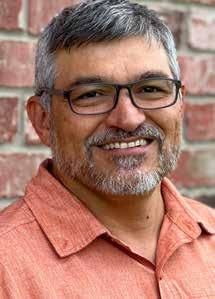
David Gomez is the district superintendent of the Alliance South Central District, which spans Texas, Oklahoma, Arkansas, and Louisiana. He and his wife, Irma, live in Texas.
Below: The world of aquaculture is no stranger to Alliance ministry—like this Mission 2535 fish farm in the Dominican Republic, a project of marketplace ministries workers.


by Heidi, an Alliance worker serving in Europe
Every morning in the winter we play a family game called “Are the mountains there today?”
Sometimes we can see the snow-capped peaks of the majestic Sharri Mountains. Oh, those days of glass-blue skies, when we are awed by the immensity and beauty of nature, overwhelmed with gratitude for a God who creates something so imposing yet exquisitely detailed! Those are the days of easy praise.
Then there are the days when the mountains, obscured in a murky mix of low-lying clouds and graybrown smog, don’t even seem to exist. On those days, it’s easy to get used to not seeing them, easy to forget we live in a basin surrounded by magnificent mountains.
In the winter, we sometimes feel as though we live at the bottom of a smoke-filled bowl covered with a lid. We are hidden from what we know is there and find so awe-inspiring.
“Are the mountains there today?” we ask.
Sometimes we need to remember they are still exactly where God put them.
At times, the spiritual atmosphere in this Balkan country feels like the physical atmosphere. With an evangelical population of less than 1 percent, we sometimes feel as though we live under a heavy spiritual cloud. Yet just
like we know the mountains exist on smoggy days, we know God is not only present but is also accessible and powerful. We would love nothing more than to shout it from the mountains.
Our work at a community center in the capital city positions us each day on a bustling street in a low-income neighborhood. Our classes and programs— including an English conversation club, art classes, and a group for moms and littles—bring us in close contact with hundreds of unsaved people every week. Because of your generosity and prayers, we moved the center to a bigger space last fall. Since then, we see more and more tweens and teens coming in to play games, do homework, and just hang out. Moms often stay to have coffee while their kids attend programs, and even some dads and grandpas come in. We have several comfortable seating areas for small gatherings. Deeper conversations often happen over a cup of coffee or after games of UNO or chess. In this culture, sometimes it takes many cups of coffee or many rounds of UNO to get below the surface. We work hard to be trustworthy, loving, and kind. We make room to be disrupted from our Western, workfocused mindset. We set aside agendas and to-dos so that we are available for a student who asks, “Teacher, are you a Christian? I have some questions”; or for a young mother who confides she’s been struggling with crippling anxiety and needs prayer; or for a new believer who is seeking mentoring. Your faith-filled prayers and giving make these opportunities possible.
Although relationships may be hard to build at times, we are continually encouraged by the way our work is received—like when a teenager says the community center is her “safe place.” Or when an unemployed father asks for a Bible and takes it home in a paper bag to avoid being seen with it on the street. Or when a diaspora college student, home for a visit, finds Jesus abroad and asks for Bibles and books to share Jesus with his childhood friends. The kids who crave attention—even when it comes out sideways—drink in the unconditional love from our team, and they come to know we are different.
Our mission statement is simple: You Matter. People sometimes ask, “Why are you here? Everyone wants to leave our country, and yet you came. Why?” The answer for us is easy. We want each child, teen, and adult who enters our doors to feel and know they matter to us and to God. We want them to understand they are loved in a way they have never experienced.
Our vision is to be a bridge to the local church. While partnerships can be complex, they are worth the effort. Several small groups from the church meet at the community center, and local believers are our primary

Evangelicals make up less than 1 percent of this Balkan country, and members of the majority religion are often wary of entering a church or participating in church-sponsored activities. By renovating a community center in the capital, you will establish a welcoming place for people of all ages and backgrounds to learn job skills, gather with friends over coffee, and experience God’s generosity, compassion, and hospitality. To help fund this project, visit cmalliance.org/give; select “a project you love/Find a project”; and type in “Prishtina Community Center.” Learn more about Alliance strategic projects throughout the world in need of your prayers and financial support by accessing the 2023–24 Strategic Giving Opportunities Gift Catalog at cmalliance.org/gift-catalogalliance-strategic-projects/ or by calling toll-free (866) 443-8262.
source of volunteers and paid staff. For most people here, the center workers and volunteers are the only believers they have ever met. God has blessed us with overflowing programs and lots of new ideas to reach more people.
And people keep coming.
Our strategy to sustain the impact of our work hinges on developing and empowering local leaders and owning property to house our ministries. Leadership recruiting and development can be exhausting—even overwhelming—at times, but as we are stretched to capacity, we keenly feel the need to grow our team. For this to happen, though, we must rely on God to draw more local believers into mission alongside us and to provide more ministry partners who send and sustain new workers through Alliance Missions. We know God is stirring hearts at this very moment to join this work.
We invite you to prayerfully consider what role God could be calling you to play in the mission to shine God’s light in this Balkan country where so many live under a cloud of despair, worry, and empty religion.
Maybe God is working in you to go. Maybe He wants you to help send more workers or help us fund new projects and acquire property to reach more people in our community with gospel access and tangible expressions of God’s love.
On the hard days, when the sooty smog obscures the mountain right in front of us, we choose to remember our Rock is still here and accomplishing His purposes even when we don’t recognize His work. Faithful ministry partners like you constantly encourage us to look beyond the clouds and smog to what is unseen. Yes, we can trust the mountain is there every day, and that is what fuels us to press on.

My name is Yuki,* and I recently joined members of my community group, including an Alliance international worker couple, at a worship service for the first time. Over lunch after the service, one of the Alliance workers seemed surprised when I said, “Explain the Christian concept of redemption.”
As he shared about the meaning of the Cross, I was trying hard to understand. In Japan, fitting in is vital. There is a Japanese saying that goes, “The nail that sticks out gets hammered down.” The “hammering” can take many forms—including bullying—but in essence, it’s social coercion. People try desperately to conform, and those who don’t pay a hefty price. Usually, they get knocked off the tracks leading to a successful life. Once that happens, there are no second chances.
I love American culture and am interested in Christianity, and I have noticed that in America, people can have second chances despite massive failures. Is this because of the Christian teaching of redemption? I’m looking for a restart, and I want to know if Christianity—and Jesus—can provide it. I will read the New Testament soon, but I believe I’m on track to finding the redemption I’m looking for.
*Name changed
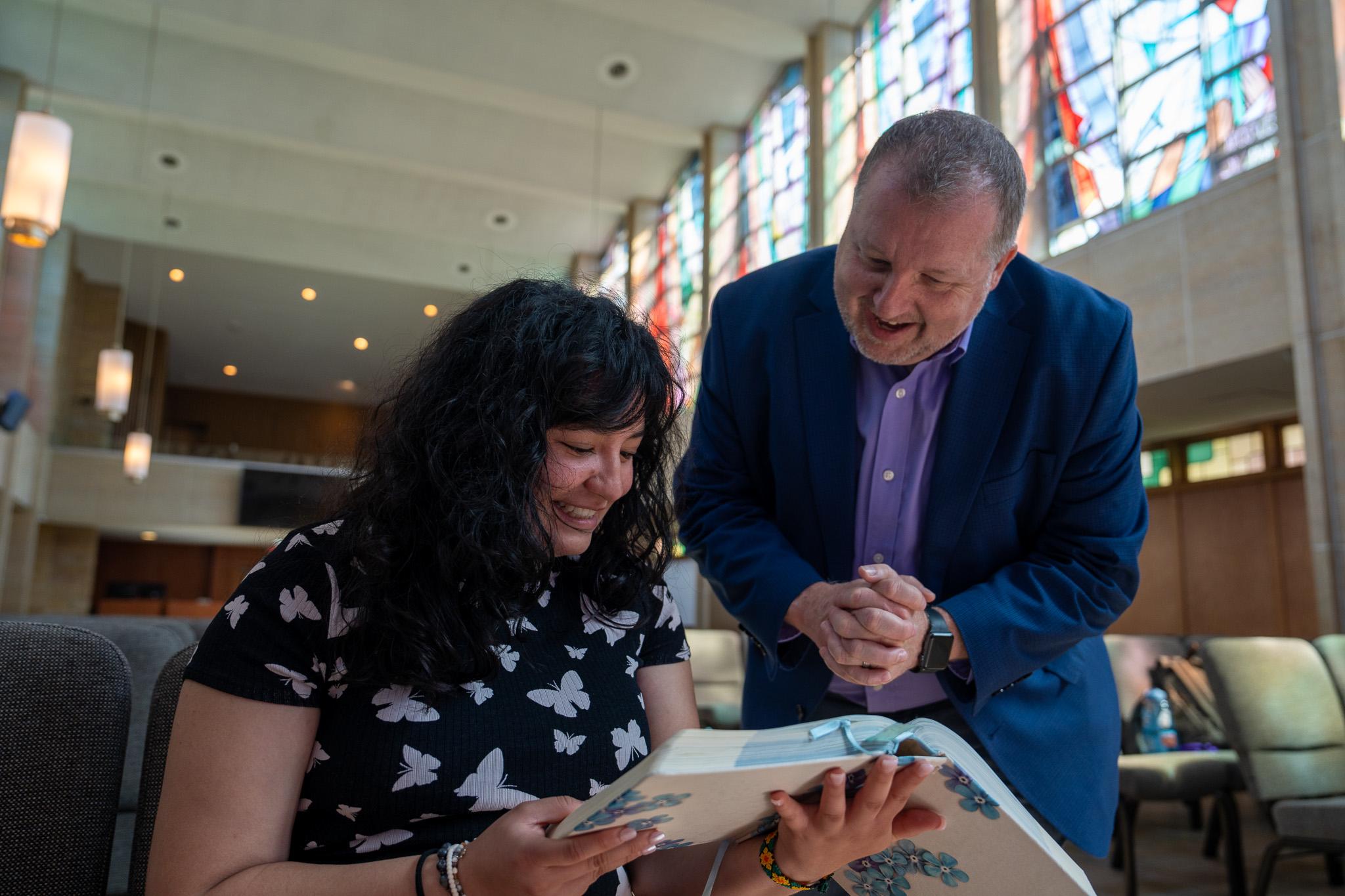
M.A. in Christian Studies
M.A. in Global Leadership
M.A. in Ministry Leadership
M.A. in Pastoral Counseling
Master of Divinity (MDiv)


“ATS accreditation validates the quality of theological education provided by the Graduate School of Ministry at Crown College. It a rms that the program is fulfilling its mission to prepare Christian Ministry leaders who think biblically, live authentically, and serve skillfully in the Christian and Missionary Alliance, the church-at-large, and the world. ”
DR. BILL KUHN DEAN OF CROWN COLLEG E SCHOOL OF THEOLOGY + MINISTRY
by Hannah Packard
We are in a darkened filming studio sitting in a huddle—Scott Lessing, a campus pastor with Grace Church in Middleburg Heights, Ohio; Andy, a video producer and editor with the Alliance National Office; Olivia, also a video producer and creative lead with the National Office; and me. The camera is recording, and everyone is in place. “Scott,” Andy says from behind the lens, “you pastor a campus with a lot of security. Can you tell me about how you get there every day?”
Scott laughs a little. “Getting into my campus is really unique,” he says. As Scott describes the process—metal detectors, no cellphones, and walking through two levels of electrified 25- to 30-foot security fences—I visualize what it was like when we visited his church, planted among incarcerated men at Lorain Correctional Institution (LorCI), over a month before.




The quarter-mile walk from security to the chapel across the yard was brisk and windy. A volunteer from Grace pushed a cart full of our film equipment as Warden Jennifer Black walked with us, answering questions and talking about the different programs they have at LorCI. We arrived at the chapel for the service early. But even with 30 minutes to spare, some of the men were already trickling in.
The room filled quickly with the sound of hands clapping backs and people saying, “It’s good to see you!” Soon, several men were sitting next to volunteers and engaging with them in deep conversations.
Once the room had filled up and the service started, it was a joy to hear them singing loudly together as the worship team—made up of excellent musicians from among the incarcerated men—led them in praise. The sermon was streamed in from the Grace Middleburg Heights campus, where Grace pastor Jonathan Schaeffer always says hello to the Lorain church from the pulpit. After the service and announcements finished, the men returned to their cell blocks for roll call, leaving some of us alone in the empty chapel. Meanwhile,
“Jesus is the only One who can get into prison without having to go through security.”
Above: The worship team is made up of excellent musicians from among the incarcerated men.
Opposite: Paul (right), a Grace volunteer, has provided mentorship that has deeply impacted the lives of some of the inmates.
Scott, Andy, and a few of the Grace volunteers were walking through the prison and praying with some of the men in the isolation cellblock. Later in the afternoon, there would be another discipleship group. But as I sat in the empty room, thinking about what I’d just experienced, I felt the nearness of Jesus.
“Jesus is the only One who can get into prison without having to go through security,” Scott likes to say. “Jesus bypasses it all, meeting with these men daily. It’s a lonely place in there. But they truly experience Jesus in ways that maybe some of us will never get to.”
LorCI is a minimum to medium security prison in Ohio, with a capacity of about 1,250 and a staff of 500. Within the prison, there are two populations—one called the cadre, consisting of men serving long-term sentences of two years or more, and one of men serving short-term sentences of nine months or fewer, typically due to parole violations. Grace’s ministry isn’t just to the incarcerated men but also to the staff within the facility. “We look at both as our community inside Lorain,” Scott says.
The church has an office set aside for their use by the chapel, which is open every day except Saturdays. Grace volunteers host 17 different programs six days a week too—discipleship groups, discussion groups, Alpha, Bible studies, a school of ministry, grief care, a Christian recovery group, and character development classes. Grace Church has fully planted and invested in LorCI for the last two years, and the lives of men have been radically transformed. So, how did this happen?
“Previously, I was the men’s pastor at Grace Church. I have a friend who has a prison ministry in Ohio, and one day he said to me, ‘The warden at Lorain Correctional wants to talk to us. She’s thinking about planting a church inside the prison,’” Scott says. “And I thought, Well, I don’t want to be the one to do it, but we’ll see who God raises up to do it. We met with her, and she was intrigued by all the different ministries that could happen at Lorain through a church.”
Not your average picture of what someone in her position might be like, Warden Jennifer Black is passionate about the men in her facility experiencing real, whole-life transformation. She was looking for a partner in that task, and Grace Church was the right fit. Though there have been practical challenges along the way, Scott speaks very highly of the warden and her staff, grateful for their help navigating what can be a difficult system of approvals. And the affection between Grace and the prison staff is mutual; when telling us about an appreciation meal that Grace volunteers threw for the LorCI staff, Warden Black teared up slightly. “Grace has become embedded in the fabric of this facility,” she says.
Though Scott was hesitant at first, God laid the ministry on his heart, telling him, I want you to do this. “The problem is that I’ve never been in prison before,” Scott shares. “I don’t always know what I’m doing. So, it was a moment of desperate dependence, saying, ‘I’ll do it, but I have to fully depend on you, Lord.’ Which is a pretty good place to be.”
Grace Church responded to the idea of the church plant with enthusiasm. “We have over 40 volunteers going out there every single week,” Scott says. “A whole other team of about 20 people are praying, calling people, calling family members of the inmates if they need help. It’s better than I ever expected.”
While visiting LorCI, Andy and I had the opportunity to speak with Joe and Lou, a couple of men from the cadre who are part of the school of ministry program that Scott has started within Lorain. Taught by Scott and the associate minister of worship and technology at Grace Church, Dr. Robin Walters, seven men at LorCI are going through a two-and-a-half-year training program that will prepare them to become licensed pastors with The Alliance. The school of ministry not only helps men like Joe and Lou grow in their faith but also trains them in the theology and practical ministry skills they will need to do ministry in prison and beyond after they
Opposite: Pastor Scott thinks that being fully dependent on the Lord, a posture necessary to his ministry, is a pretty good place to be.

“I don’t always know what I’m doing. So, it was a moment of desperate dependence, saying, ‘I’ll do it, but I have to fully depend on you, Lord.’ Which is a pretty good place to be.”

Opposite: The school of ministry helps men like Lou grow in their faith and the skills they will need to do ministry in prison and beyond.
Below: Over 40 men and women from Grace Church volunteer at LorCI each week.
are released. Part of the hope is that one day, a man like Joe or Lou might be the one planting churches in prisons. Joe especially has a passion to do ministry, both inside and, one day, outside the prison walls. “We’re not called to sit on the sidelines. We’re not called to be couch Christians. We’re called to go preach the gospel and bring people to Christ,” he says. “God changed my heart, and now my desires are different. All I desire is to serve Him and go change, transform communities.”
Community is something that both Scott and Warden Black talk a lot about. When people are sentenced to serve time and sent to a prison, they are separated from society. But they are also separated from healthy community—one of the greatest needs a person has and one
of the most vital tools of transformation. “Jesus calls us to go in and serve,” Scott says. “And that’s good. But even better is to have a church inside . . . it’s been the most fruitful ministry I’ve ever been a part of. It is so powerful to see these men feel loved and valued.”
The community and ministry to the incarcerated men in LorCI doesn’t stop after they are released. Grace in Middleburg Heights is ready to welcome them with the love of Christ as soon as they are back on the outside.
God has used Grace Church to play a major part in both Joe’s and Lou’s testimonies. “I didn’t do church on the streets,” Joe says. “So, my vision of what church was like was religious and unattractive. When I came here and I was introduced to Christ for real, I needed an example of what church really looked like. When Grace Church and Pastor Scott came in, they were inviting, warm, and genuine, and you can really see their love for God.”
Lou says, “I can humbly admit that my faith was lukewarm before I got involved with Grace. I’ll never really be able to accurately put words to how much it’s meant to me.


by
“I didn’t do church on the streets,” Joe says. “So, my vision of what church was like was religious and unattractive. When I came here and I was introduced to Christ for real, I needed an example of what church really looked like.”
To watch the video of this story, visit cmalliance.org/video/grace-inside
To go from lukewarm to on fire and from wandering and settling to really seeking, learning, and growing in my relationship with the Lord, it’s been beautiful. It’s been a gift.”
God is on the move in LorCI, but His work hasn’t stopped with just a handful of the men. “I’ve seen people get delivered,” Lou says. “I’ve seen people experience genuine love for the first time. I’ve seen fully tattooed up, gangbanging street thugs just melt, sitting in the chair in the sanctuary and feeling God’s presence.”
It was incredibly moving getting to hear Joe testify about how Jesus has transformed his life; hearing Lou preach a good word about loving Jesus and caring for one another; and hearing Tim, another inmate, talk about how a Grace volunteer’s mentorship has changed his life. In reflecting on his experience visiting LorCI, conducting interviews, and video editing, Andy says, “The Lord has worked on my heart while putting this story together. The brothers that I met inside have increased my faith in Jesus and love for Him. They deserve the Church’s encouragement, empathy, and attention.”
Many churches and Christian organizations do prison ministry—but it’s far rarer to see a church planted inside prison walls. One of my favorite translations of John 1:14 is from The Message, which says, “The Word became flesh and blood, and moved into the neighborhood.” Living on mission with Jesus often looks like that—moving into the neighborhood. Or, like Joe says it, Grace had the dedication to come inside and set up shop. Real, whole-life transformation is happening at LorCI, and a lot of that is because Scott, all the volunteers, and Grace Church itself committed to setting up shop inside the prison walls. “I call this church Grace Inside,” Joe says. “They’re Grace Outside, but they’ve brought it inside.”
“The Alliance is passionate about reaching every people group, especially the forgotten ones, the overlooked ones. And that’s who the inmates and staff in the incarcerated community are—they are the overlooked, the forgotten ones,” Scott says. “The Lord loves us so much that He went to great lengths to love and rescue us. We can’t rescue these men, but we can love them like Jesus did.”
Not all the places in the world lacking gospel access are on the other side of the globe. Some of them are here, just down the road. The Prison Policy Initiative reports that there are nearly two million incarcerated people in the United States, held in over 1,500 state prisons, nearly 100 federal prisons, and more than 3,000 local jails and 1,300 juvenile correctional facilities. Everyone we spoke to—the warden, Scott, Joe, Lou, and the Grace volunteers—all agreed that the U.S. prison system could use more churches like Grace’s Lorain campus. And as Warden Black shared with us, prisons and correctional facilities often depend on volunteers—and many of those volunteers come from churches. “No matter what someone has done in their life, everyone deserves the hope that Jesus can bring,” Scott says.
Lou exhorts believers everywhere, but especially among The Alliance, to consider getting involved with prison ministry, whether it be volunteering or perhaps planting a church. “I pray that if you feel like God is putting it on your heart or is trying to nudge you in that direction, that you would yield to the Spirit of obedience, because God can use you in mighty ways that you can’t even fathom.”

Hannah Packard is the managing editor of Alliance Life magazine. She earned her master of divinity from Asbury Theological Seminary in 2021 and is pleased to serve the Lord, and The Alliance, through storytelling.

Kelingking Beach can be found along the southwest edge of Nusa Penida, a remote island off the coast of Bali. With its rolling hills, lush green vegetation, and bright blue water, the island is a sought-after tourist destination. To access the beach, however, visitors must climb down a long set of steep, uneven stairs along the cliffside. Many are deterred by the exhausting climb, but those who make the trek often say it is one of the most beautiful places in Indonesia.

Dear Alliance family,
The Board of Directors of The Christian and Missionary Alliance met online for the June meeting, which spanned over two days. Though some Board members were awake at strange hours due to their locations overseas, we had a full and productive meeting.
Our gathering times began with prayer and reflection guided by Scripture passages from 2 Kings 4:1–7 and Isaiah 65:24. These times of prayer and reflection were led by Board members Julio Orozco and David Smith. We received reports from the various vice presidents and Board committees. The status on the Simpson grave relocation from the previous Nyack College campus to its new location was briefly shared. Our C&MA Chinese Churches Association generously raised a substantial portion of the funds necessary for this relocation process.
The three Alliance retirement communities provided encouraging annual reports to the Board. After several years dealing with the aftereffects of the COVID-19 pandemic, each reported a full recovery from pandemicrelated financial and health issues. Shell Point is nearing completion of repair from Hurricane Ian, from which the community had more than $80,000,000 in damages. The Board also approved board members for Shell Point and Town and Country.
Updates were given regarding a modified plan for the completion of One Alliance Place. This redesigned campus and building plan will align with the city of Reynoldsburg’s hopes, engage the community, and save a significant amount of money. The Board approved for One Alliance Place to be redesigned. Final proposals will be brought back to the November meeting.
Retired Alliance Missions Assistant Vice President James Malone was appointed as a member of the Sensitive Issues Consultative Group, and Hazael L. Morell and Jennifer K. Ashby, respectively, were reappointed as Board chairperson and vice chairperson.
The highlight of Board meetings for many of us is the appointment of new international workers. To the glory of God, at this Board meeting, we were able to approve eight additional new workers to five different regions. With these, we have exceeded the annual now. goals set for this fiscal year, and we’ve had the privilege of appointing 54 workers since General Council. We spent time in prayer for each of the new appointees.
In Christ’s love,

Thomas George Corporate Secretary

The sun never sets on the Alliance family, spread out across the globe. Wherever we find ourselves, we can be certain that we are each sent. Just as the Father sent Jesus to proclaim the upside-down Kingdom of love, so He’s sending us.
tch John tell a story, share a devotional, issue challenge, or cast C&MA vision. Released on the 12th of each month.

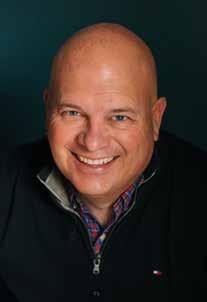
Brian Scott and his wife, Susan, live in Nicholasville, Kentucky. He currently serves in the office of the Ohio Valley District.
Recent Releases: Blog 131: In An Age of Advance Blog 132: now.
cmalliance.org/stumbo-video
After our church’s average attendance increased earlier this year, we sensed the Holy Spirit telling us to share the gospel with the senior citizens in the community next door. We were almost maxed out as it was, so I told God we just couldn’t handle that many people but prayed, “Your will be done.” Wonderful things happened after that. Two teenagers being raised by their grandparents in the senior community started attending our English class through a friend who introduced them to our church. In March, we were pleasantly surprised when their grandmother, A Hua, came with them to church, along with their neighbors.
A Hua was moved to tears throughout the service. She soon started attending the Wednesday night prayer meeting, where she received Christ as her Savior. Afterward, she told us that she finally found her Heavenly Father after worshiping idols for over 30 years! Pray that as more people attend the Flow Church, God will provide the additional space we need.
Jason and Andi, Alliance international workers serving with aXcess
Praise God for the first West African Regional Farming God’s Way (FGW) training held in May. Some 60 participants from 26 countries were represented, including many international workers serving with CAMA, The Alliance’s relief and development arm. Food insecurity and drought have led to malnutrition and other issues that West Africans must deal with daily to survive. Spiritual poverty is also prevalent as many practice ancestral worship and the majority religion. FGW was founded to help individuals, NGOs, and churches make a difference in the communities where they have influence. Participants included those who desire to use FGW as a tool to reach the nations. Some of the non-Christian participants were deeply touched by the teaching from God’s Word. Pray that attendees will continue to implement what they have learned in their local towns and villages and use it to expand the Kingdom throughout West Africa.
—based on an update by Tom, a CAMA global partner
God is bringing a diversity of people to our church’s community nights. We’ve had neighbor kids from single-parent homes, followers of other religions, and a wide variety of nationalities. The first hour includes games and a meal. There’s a 10-minute Bible story time, then the kids and several of the adults head up to the gym, where the bouncy house and other activities are a big hit. In the warmer months, we bring the bouncy house, story, food, and games outside. Some ethnic neighbors cooked a meal one night and expressed interest in attending church. Jerry spent an hour one evening answering questions about the Bible and sharing the gospel with a neighbor from a Middle Eastern country.
We also connected with a local church that is partnering with us in providing English and homework assistance in another ethnic community. Two retired volunteers have been going weekly and have continued throughout the summer. Pray for opportunities to share the gospel and for dreams and visions of Jesus!
—Jerry and Shelly, Alliance workers serving in the Twin Cities

At the West African Regional Farming God’s Way training, 60 participants from 26 countries learned proven, biblical growing practices to help meet people’s basic needs and break the yoke of poverty in West Africa.
Connie G. Seale, in June. Connie serves with aXcess and is involved in church ministries and language supervision.
CAMBODIA
Todd M. and Danielle J. Jorgenson and family, in June. The Jorgensons serve with aXcess.
CONGO SOUTH TEAM
Chia-Lin C. Yu, in June. Chia-Lin serves with aXcess and is involved in evangelism.
INDONESIA
Kara E. Gruber, in June. Kara serves with aXcess.
Barry N. and Patty M. Jordan, in June. The Jordans serve with aXcess and are involved in discipleship ministries, youth ministries, and evangelism.
Donald A. and Rachel G. Schaeffer and family, in June. The Schaeffers serve with aXcess and are involved in church planting and youth ministries.
Stephen A. and Yire S. Woerner and family, in June. The Woerners serve with aXcess and are involved in church ministries and language supervision.
SENEGAL
Eric D. and Victoria S. Bill and family, in June. The Bills serve with Envision as site associates.
Fung-Yee Lam, in June. Fung-Yee serves with aXcess and is involved in church planting and diaspora ministries.
Andrew T. Babyak, pastor, Discover Church, Camp Hill, Pa.
Barry L. Baker, pastor of outreach and church growth, Calvary Alliance Church, Cincinnati, Ohio
Jose D. Bido Lopez, pastor, Iglesia ACyM de Toa Alta (P.R.)
Peter J. Cannizzaro, special assignment, Eastern PA District
Shuang Chen, assistant pastor, San Jose (Calif.) Chinese Alliance Church
Blaise N. Chrzastek, churchplanting pastor, Represent Church, Medford, N Y
E. Frank Clay Jr., The Alliance South
Jason M. Fickes, associate pastor, Daybreak Church, Mechanicsburg, Pa.
Jordan M. Flanders, pastor, Piedmont Park Alliance Church, Tallahassee, Fla.
Michael Gilmore, youth pastor, The Awakening Church, Murrieta, Calif
John D. Herman, youth pastor, Morgantown (W.Va.) Alliance Church
Jimmie O Hull, special assignment, The Alliance South
Jackie Humrich, soul care coordinator, The Gathering Church Network, Lincoln, Neb.
Samuel B. Kes, assistant pastor, San Jose (Calif.) Chinese Alliance Church
Jason A. Kochsiek, lay minister, The Grove Community Church, Riverside, Calif.
Andrew J. Kotansky, food service director, Big Sandy Camp & Retreat Center, McGregor, Minn.
Joseph C. Lazurek III, interim pastor, Cornerstone Alliance Church, Dickson City, Pa.
Gabriela Martinez Seda, evangelist, Puerto Rico District
Mitch N. Massey, pastor, Apalachin (N.Y.) C&MA Church
Chad M. McDonald, pastor, Korean District
Joshua Medina, pastor, Second Avenue Church, New York, N.Y.
Abishua C. Moua, youth pastor, Central Grace Hmong Alliance Church, Modesto, Calif.
Emilio J. Negron Velez, assistant pastor, ACM Utuado (P.R.) Pueblo
Bruce A. Overstreet, interim pastor, Forest (Va.) Alliance Church
William Pacheco, elder, ACM Sinai, Mayaguez, P.R.
Samuel T. Parsons, lead pastor, Ohio Valley District
Gerardo Pena, church planter/ pastor, Newberry Church Plant, Eastern PA District
Rafael A. Perez Ramirez, pastor, La Alianza de Factor Arecibo, Sabana Hoyos, P.R.
Timothy J. Poferl, lead pastor, Peoples Church, Geneva, Ohio
Spencer D. Robinette, pastor of worship, Calvary Alliance Church, Cincinnati, Ohio
Alexis Rolon, assistant pastor, Iglesia ACyM de Arlington (Va.)
Brian M. Shore, pastor, Alliance New England
Terry D. Smith, lead pastor, Locust Valley Chapel, Coopersburg, Pa.
Nestor F. Soto, pastor, Alliance Community Fellowship, Ruthland, Vt.
Samantha R. Tait, director of care and counseling, Crosspoint Church, Temecula, Calif.
Jason D. Taylor, pastor, Mercy Church, Sioux Falls, S.Dak.
Fue Thao, assistant pastor, Hmong New Hope Alliance Church, Auburn, Ga.
Char B. Thao, pastor, Faith in Christ Hmong Alliance Church, Brown Deer, Wis.
Matthew J. Thornton, lead pastor, Lakeview Chapel, Owego, N.Y.
Melanie M. Thornton, ministry and administrative specialist, Northeastern District
Angie Y. Valli, church planter, Alliance New England
Olaf P. Valli, church planter, Alliance New England
Nou S. Vang, pastor, Christ Redeemed Alliance Church, Hickory, N.C.
Souk Vang, senior pastor, Tulsa (Okla.) Hmong Alliance Church
Chad A. Woolf, regional director, Alliance Southeast
Touhoua Yang, assistant pastor, Tulsa (Okla.) Hmong Alliance Church


At Shell Point® , you’ll enjoy a fulfilling lifestyle where you can explore, worship, learn, grow and even continue to serve. And with new additions to our campus, like Tribby Arts Center, a sparkling centerpiece for the arts, and the state-of-the-art Larsen Health Center, you can rest on a firm foundation, knowing that your needs will be taken care of – both now and in the future.
Unparalleled setting. Unparalleled lifestyle.™
Shell Point is located in Fort Myers, Florida, just minutes from the islands of Sanibel and Captiva.
Roslyn, Wash., Swift Water Church, 300 W. Idaho St., 98941
Toa Alta, P.R., La Alianza Cristiana y Misionera de Toa Alta, 00953
Christian M. Ballenger, worship pastor, Allegheny Center C&MA Church, Pittsburgh, Pa.
Tyler C. Burns, church planter, Alliance New England
Manuel Bustamante, church planter, Alliance South Central
Devin J. Calhoun, church-planting pastor, Neighborhood Church, Rockville, Md.
Jeramy Collins, children’s ministry pastor, South Tongass Alliance Church, Ketchikan, Alaska
William E. Corbin, pastor of college ministries, Common Places Church, Lock Haven, Pa.
Jon Davidsen, missions leader, Church on the Rock, Tuscon, Ariz.
Jesus Duran Figueroa, elder, Iglesia ACyM de Ciales (P.R.)
Larry E. Dyson, pastor, Alliance Family Fellowship, Dover, Del.
Daniel Frederick, pastor, The Refuge Church, Bremerton, Wash.
Caleb T. Gee, student ministries pastor, Essex Alliance Church, Essex Junction, Vt.
Melissa Guay, connections director, Pine Knolls Alliance Church, South Glen Falls, N.Y.
Matt J. Hamilton, assistant director of church ministry, Parkside Chapel, Visalia, Calif.
Mariela Henry, servant leader, Evangelical Christian Alliance Church, Spring Valley, N.Y.
Daniel L. Hintz, executive pastor of ministry, CrossWay Church, Germantown, Wis.
Derek W. Howell, pastoral resident, Dorseyville Alliance Church, Pittsburgh, Pa.
Ezra Johnson, adult ministries pastor, Christ Community Church, Rochester, Minn.
Justin T. Johnson, pastor, Grace Crossing, Louisville, Ky.
Samweli Kadegembe, pastor, Ohio Valley District
Daniel D. Kue, youth pastor, Charlotte (N.C.) Hmong Alliance Church
Joshua Kwon, church planter, Metropolitan District
Daniel H. Lee, associate pastor, Kairos Church, Kendall Park, N.J.
Abel Mejia Lopez, assistant pastor, Iglesia Vide Nueva, Suwanee, Ga.
Delma R. Maldonado, special assignment, Iglesia Alianza de Cabo Rojo (P.R.)
Brandon C. Massie, Greenhouse resident, Fairhaven Church, Dayton, Ohio
Mades Meas, pastor, Celebration Church, Santa Ana, Calif.
Corey D. Miller, youth pastor, Washington (Pa.) C&MA Church
Josiah J. Molter, youth pastor, Hope Church, Brunswick, Ohio
Kay L. Morris, pastor of youth and children’s ministry, Crosspoint Alliance Church, Perham, Minn.
Daniel K. Muir Jr., pastor, Chippewa Alliance Church, Beaver Falls, Pa.
Michael Nelson, pastor, Sonrise Christian Fellowship, Enid, Okla.
Van Nguyen, local church ministry, Grace Alliance Church, Milpitas, Calif.
Zachary M. Osbrink, youth director, Menomonie (Wis.) Alliance Church
Cade Paulson, youth pastor, Heart Church, Fox Island, Wash.
Liem Phan, church planter, Alliance South Central
Narin Phuong, assistant pastor, Hacienda Heights Cambodian Evangelical Church, Pomona, Calif.
Madelin Rivera, director of Christian education, El Oasis, Lebanon, Pa.
Luis A. Rodriguez, assistant pastor, Centro Cristiano de Adoracion, Providence, R.I.
Hector Rosado Rivera, special assignment, Iglesia Alianza de Cabo Rojo (P.R.)
Heidi R. Rufener, pastor of family and community development, Cornerstone Alliance Church, Marion, Ohio
Kevin A. Tompkins, lay ministry leader/head elder, Reidsville (N.C.) Alliance Church
Rodger L. Weese, special assignment, Island Alliance Church, Stevensville, Md.
Curtis West, Greenhouse resident, First Alliance Church, Columbus, Ohio
John Wilson, lead pastor, South Pacific Alliance
Josiah W. Wright, assistant director of worship and community engagement, Cornerstone Christian Fellowship, Hilliard, Ohio
Toua J. Yang, worship pastor, Hmong Alliance Church, Coon Rapids, Minn.
Michael "Mike" William Gabler, February 13, South Pacific Alliance District Office, Temecula Calif. Mike is the youth pastor at Mosaic Church, Henderson, Nev.
Lauren Reyes, May 5, Connexion Church, Bowling Green, Ky. Lauren is an Alliance international worker serving with aXcess in Paraguay.
Thomas “Tom” Milton Hanks, May 19, First Alliance Church, Columbus, Ohio. Tom is the senior pastor of Kenton (Ohio) Alliance Church.
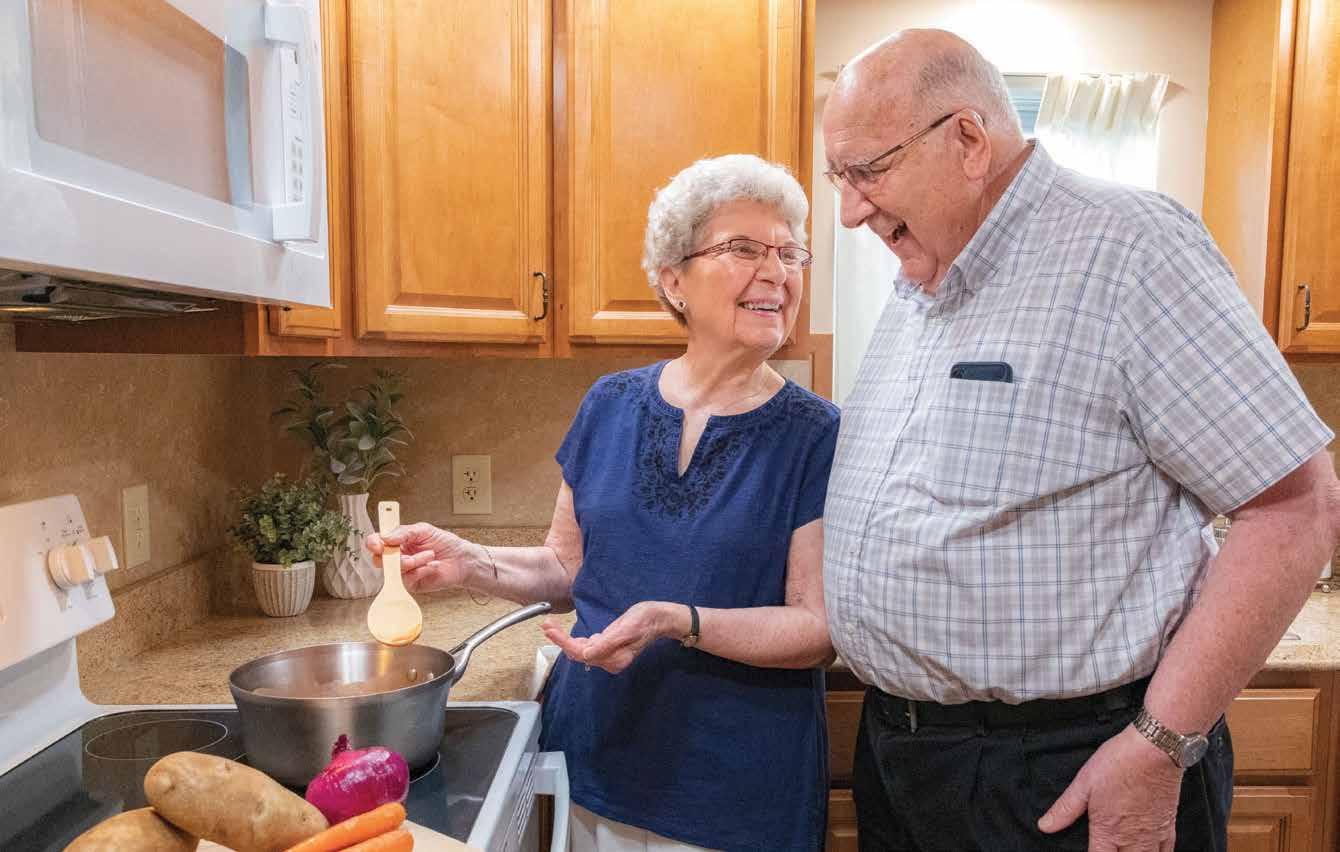
Choosing the senior living community that’s right for you feels like finding family. At Chapel Pointe, discover a safe, active, and Christ-centered lifestyle where each person matters. Our community offers a full continuum of care, so if your needs change, your address doesn’t have to. Join the Chapel Pointe family and experience a place where faith, fellowship, and peace of mind are at the heart of everything we do.
www.ChapelPointe.org | 770 South Hanover Street, Carlisle, PA
Chapel Pointe is affiliated with the C&MA.


Douglas L. Enck, Eastern PA District
David A. Havener, Eastern PA District
Tedd M. Lewellen, Great Lakes District
Boi H. Nguyen, Vietnamese District
Samuel H. Ong, Vietnamese District
David J. Riemenschneider, Midwest District
Philip A. Strong, Ohio Valley District
Steven M. Yost, MidAmerica District

Ian Hoover
December 5, 1932–May 4, 2024
Ian was born in Alameda, Calif. After graduating high school, he enlisted in the Marines, where he served for two
years before enrolling in Simpson Bible College, now Simpson University in Redding, Calif. (1952–1957). On August 6, 1955, Ian married Roberta Hilliard, with whom he enjoyed 61 years of marriage.
For over 43 years of C&MA ministry, Ian served pastorates in Wolf Creek, Ore. (1959–1963); Renton, Wash. (1967–1971); Des Moines (1971–1972) and Newton, Iowa (1972–1979); Longview, Tex. (1979–1985); and Council Bluffs (1985–1988) and Blairsburg, Iowa (1989–1997). In addition to his role as a senior pastor, Ian actively participated in church planting and served as an outstanding personal, marriage, and family counselor. He also developed a passion for the well-being of police officers and served as a chaplain for the Newton and Council Bluffs, Iowa, police departments and the Iowa State Patrol.
In his lifetime, Ian was instrumental in leading hundreds of people to Christ and never missed an opportunity to hand out a Bible tract or pray with someone. At 90 years of age, he was still leading a Bible study at his assisted living center and preaching the gospel.
Ian was predeceased by his wife; daughter Julene; and great-granddaughters Maisey and Elora; he is survived by children Michael, Jeffrey, Gary, and Jennifer; 9 grandchildren; and 12 great-grandchildren.

Richard “Rick” Leon Drummond
August 13, 1941– May 16, 2024
Born in Jacksonville, Fla., Rick attended Toccoa Falls (Ga.) College (1959–1963), where he met Beth, the daughter of missionaries in Vietnam. Together they planned to join the missions effort, but in his junior year, Rick developed severe back pain and had to drop out of college for a semester. Despite his doctor telling him he could never serve overseas, he did so for over 40 years.
Rick and Beth married in 1965 and enrolled in Jaffray School of World Missions in New York. In 1967, at the height of the war, they left for Vietnam for their first C&MA overseas ministry assignment. Shortly after they arrived, there was a military offensive, and Beth’s father, Bob Ziemer, was killed, along with four other missionaries. Rick and Beth continued to serve through the conflict, mentoring young pastors and working in evangelism.

Normadine Luckenbill Kirkpatrick
December 25, 1934 – May 21, 2024
Born in Bend, Ore., Normadine accepted Christ at the age of 10, and her father received Him that same night. Three years later, the Lord began dealing with Normadine’s heart concerning missions. Initially, she resisted God’s call but eventually yielded to His will. The Lord directed her to train for the teaching field. She received her BA from Simpson University in Redding, Calif., and completed her master’s at Southern Oregon State College in Ashland.
For over 20 years, Normadine taught at Dalat International School, which was founded in 1929 for the children of international workers. It was originally located in Vietnam and later moved to Thailand and then Malaysia. Normadine taught at the school in all three countries. On November 19, 1983, Normadine married Ellis Kirkpatrick in Bend, Ore. Normadine is survived by her husband.
In March 1975, the Drummonds were forced to evacuate when the North took control of South Vietnam. Rick worked with Operation Heartbeat in Fort Chaffee, Ark., assisting Vietnamese refugees and then studied at Fuller Theological Seminary in Pasadena, Calif. In 1977, they were reassigned to Indonesia, where the Lord continued to bring Vietnamese people into their lives. Rick was asked to help set up an emergency camp for Vietnamese refugees fleeing in boats to the Riau Islands. After establishing this work, he and Beth returned to the island of Java, Indonesia.
In 1980, Rick shattered his femur in a head-on collision. He was evacuated to Singapore and then returned with his family to the States to recover. Following surgery, his doctor told him he would never walk again, but in 1982 he returned to Java. He and Beth worked with a church-planting initiative, trained lay leaders, and taught at Simpson Theological Seminary until 1994.
The C&MA then reassigned them to Cambodia. As they studied Khmer, they learned of over a million displaced Vietnamese immigrants in Cambodia. God strategically placed them to help form a churchplanting ministry among these immigrants called New Hope. Under Rick and Beth’s leadership, it grew to include education, medical, and anti – human trafficking initiatives. Rick and Beth served with New Hope until 2007 and then returned for two years in 2012 with International Teams to launch an outreach to the Vietnamese in Siem Reap, Cambodia. Rick is survived by his wife; children Rob, Kim, Christy, and Jason; and 10 grandchildren.

Alexander “Alex” Kent Zell
July 25, 1963–May 21, 2024
Born in Seattle, Wash., Alex accepted Christ at the age of five through a Good News Club and was called to missions as a 12-year-old. He received his bachelor’s from Toccoa Falls (Ga.) College in 1958 and his master’s from Alliance Theological Seminary (New York, N.Y.) in 1991.
In 2013, Alex earned his PhD from Trinity International University (Deerfield, Ill.). He married Julie Kingsbury on July 8, 1989, in Jewett City, Conn.
For 39 years, Alex served the C&MA in a variety of settings, including churches in Waldorf, Md. (1985−1986); and Greenfield, Mass. (1994–1995). He and Julie were also C&MA missionaries in São Paulo, Brazil (1995−2011), where Alex served at the Vila Madalena, Itatiba, and Paraíso Alliance churches. He was also involved in FATELA, the C&MA’s Latin American seminary program, now known as Seminario Teológico A. W. Tozer.
After 15 years on the field, Alex pastored churches in Geneva, Ohio (2011–2017); and Tappan, N.Y. (1989–1990). He was also an adjunct professor at Crown College (St. Bonifacius, Minn.). In 2017, Alex accepted the offer to serve there as director of online Christian studies. Alex’s three biggest passions were his family, equipping leaders, and talking to people about Jesus. He died unexpectedly at the age of 60 in Minot, N.Dak.
Alex is survived by his wife; daughters Melissa, Jodi, and Linsey; and 1 granddaughter.
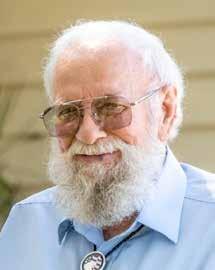
James “Jim” Earl Weiss
July 25, 1938 – June 5, 2024
Jim was born in Akron, Ohio. While in his early thirties, he experienced a dramatic conversion that amazed his coworkers to the point that they wondered what had happened to him. On May 2, 1959, he married his first wife, Joan Deem. Despite many scholastic challenges, including what today would be considered ADHD and dyslexia, Jim persevered to receive a BA in Bible and theology from Toccoa Falls (Ga.) College (1976–1980) and an MA in Bible and theology from the college’s graduate program (1996–2002). Jim could also give a clear testimony of how God protected him and his family when the Kelly Barnes Dam, located above Toccoa Falls College, failed in the early morning hours of November 6, 1977. The resulting flood killed 39 people.
In 1983, Jim was ordained by the C&MA and pastored a small Baptist church in Clayton, Ga., for two years. During 41 years of C&MA ministry, Jim served churches in Clewiston and Titusville, Fla. (1981−1984); Keystone Heights, Fla. (1984−1992); Clayton, Ga. (1992−1999); and Leesburg, Fla. (1999−2022). Jim and Joan also planted a C&MA church in Clayton. Joan died in 1995 after a battle with cancer. On August 23, 1997, Jim married Janet Gardner in Toccoa Falls. They continued serving at the church in Clayton until it closed in 1998. In 1999, the couple moved to Leesburg, Fla., where Jim was the senior pastor of The Alliance Church of Leesburg until 2016, when he turned 78. Still not ready to retire, he stepped aside and became the assistant pastor, serving with several short-term pastors until he finally retired at the age of 84 in 2022.
In addition to pastoring in Leesburg, Jim was a volunteer chaplain at local hospitals and hospices and pursued training in clinical pastoral education. He impacted many people with God’s love through this ministry. Jim died at the age of 85 after battling an infection that resulted in serious health problems.
Jim is survived by his wife Janet; children Terri, Heather, Jim, and Bob; 4 grandchildren; and 7 great-grandchildren.

Dorothy Lacer Kroh
December 22, 1924–June 7, 2024
Born in Evansville, Ind., Dorothy grew up on a farm. During WWII , she worked at the Servel War Plant, helping to build wings for P-47 fighter planes. She attended Moody Bible Institute (1946 –1947) and took additional coursework at St. Paul Bible Institute (now Crown College, St. Bonifacius, Minn.). While
studying at Moody Bible Institute, she met Laird Lewis Kroh; they married on August 10, 1947, in Chicago, Ill.
Dorothy served with Laird as a C&MA international worker in Israel (1953–1969). While they were there, the Suez and the Six-Day Wars occurred. The couple returned to the States in 1968 and served together in pastoral ministry with the C&MA in Croft and Egypt, Pa. (1969–1973); Jeannette, Pa. (1973–1985); and Springville, N.Y. (1986 –1987). Together, they pastored senior adults at Allegany Center Alliance Church in Pittsburgh, Pa. (1991–2000). They retired in 2000. Laird died in 2022 the day after their 75th wedding anniversary. Dorothy died in Cabot, Pa., at the age of 99.
Dorothy is survived by children Laird Jr., Stephen, and Joanna; 5 grandchildren; and 6 great-grandchildren.

Elaine Sutton Ulrich
June 9, 1925 – June 8, 2024
Born in Meadville, Pa., Elaine graduated summa cum laude from Geneva College in 1945 with a BA in Latin/Spanish. On August 6, 1949, she married Edward W. Ulrich at Meadville Alliance Church.
Together they served as C&MA missionaries in Makassar, Sulawesi, Indonesia; and Sentani, Dutch New Guinea, now Papua, Indonesia (1952–1959). They also ministered in the Sharon (Pa.) Alliance Church and North Mar Alliance Church in Warren, Ohio (1960−2010). In 1954, when Edward was part of the first C&MA team to fly into the Baliem Valley (then Dutch New Guinea), Elaine provided support from the base station in Sentani. In April 2024, during the 70th anniversary celebration of that event, Elaine shared her experiences of that historic day with the Chapel Pointe at Carlisle nursing home community. Prior to moving to Chapel Pointe, Elaine was an active member in the C&MA church in Sharon, Pa., and in the North Mar, Warren, Ohio, church as a pianist and Sunday school teacher. She died just one day shy of her 99th birthday in Chapel Pointe, Carlisle, Pa.
Elaine is survived by daughters Lynne, Laurie, and Leslie; 6 grandchildren; and 12 great-grandchildren.

Adapted by Alliance Life staff from an article written by Rev. Fred A. Smith in Neiva, Colombia, originally published in The Alliance Weekly on June 12, 1943.
Boarding the train, I slung my suitcase on the rack and sat down on the wooden seat. Glancing out the window, my gaze fell upon the rugged range of distant mountains beyond the flat Huila valley. The scenery was beautiful with the bright sunshine flooding all, but thoughts raced through my mind of that which existed among those hills, which was not beautiful, and where the sunshine of Christ had not been permitted to come.
Passing these huts in the mountains in the evening, one might hear fervent repeating of prayers and moving of beads, but it is to an “unknown God,” one whom they have heard about but have never come to know because they do not know the way to Him.
But looking out of the other window of the train, across the plain and up into the high central range of the Andes, I thought of Campohermoso, which was like the rest of the districts, but now is different.
About 14 years ago, a Bible found its way into the hands of a farmer, Zoilo Torres, who called his three brothers together to consider its teachings. In those
days, a man passed through there preaching Christ as the only Savior, to whom they listened. Five years later (1934), a missionary entered that region for the first time. He found a group of believers with a little straw-roofed chapel, where they worshiped the Lord, and seven persons ready for baptism. The work progressed under the leadership of the Holy Spirit, using Don Zoilo and his fellow farmers as instruments to explain the Word of God.
As the congregation grew, it was necessary to build another chapel, which also became too small for the attendance. About three years ago, a larger chapel was constructed; but when special meetings are held, even this is too small.
Well over 100 have followed the Lord in baptism, and the most recent word from there tells of about 70 professed conversions and a revival among the believers. At a meeting a few months ago, when I called for volunteers to carry the gospel to neighboring districts, 20 young men raised their hands.
The train continued along, and my thoughts turned again to the many mountain settlements and numerous valley towns where the gospel of Christ and its power are as yet practically unknown. A prayer surged from my heart that the revival fires of Campohermoso might spread across the valley, through village and city, and on into neighboring states, in such convicting power that multitudes might turn from their superstition and sin to know the Living Christ.

A donor-advised fund (DAF) is a simple, tax-smart way to advance The Alliance’s All of Jesus for All the World vision. A DAF enables you to contribute cash, securities, or appreciated assets in ways that can significantly increase the impact of your giving and help reduce your taxes. And what better use of your giving than to see more churches planted among the world’s remaining unreached and overlooked peoples?
TO GET STARTED:
• Call 833.672.4255 • Email service@orchardalliance.org
• Scan the QR code

Orchard Alliance, 8595 Explorer Dr, Colorado Springs, CO 80920 / 833.672.4255 / orchardalliance.org
Information included in this advertisement is not to be considered financial, legal, or tax advice. Please consult your legal and/or tax advisor prior to acting on anything presented in this advertisement. ©2024 Orchard Alliance


